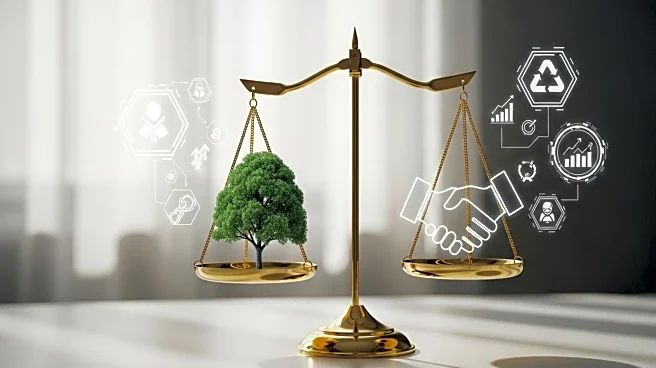What is the story about?
What's Happening?
A recent article explores the concept of economic democracy and the solidarity economy, highlighting the efforts of various organizations and individuals to create a more equitable economic system. The piece discusses the legacy of W.E.B. Du Bois and his insights into racial dynamics and global economics, which remain relevant today. It also examines the Cooperative Fund of the Northeast (CFNE), a community development financial institution that supports cooperatives through pooled social investments. The article further delves into the Black Solidarity Movement Assembly in Atlanta, where leaders gathered to envision a new economy inclusive of marginalized communities. Additionally, the piece reflects on the Association for Cooperative Educators Institute in Montreal, showcasing young people's efforts to transform urban agriculture and design for social change.
Why It's Important?
The exploration of economic democracy and solidarity economy is significant as it addresses systemic inequalities and seeks to empower marginalized communities. By promoting cooperative models and democratized capital, these initiatives aim to create sustainable and inclusive economic systems. The focus on community ownership and self-determination challenges traditional capitalist structures and offers alternative pathways for economic development. This approach has the potential to reduce economic disparities and foster social justice, benefiting communities that have historically been excluded from mainstream economic opportunities.
What's Next?
The ongoing efforts to build a solidarity economy and promote economic democracy are likely to continue, with organizations and individuals working to expand cooperative models and democratize finance. Future conferences and assemblies may further refine strategies and strengthen networks among stakeholders. As these movements gain traction, they may influence policy discussions and encourage more investment in community-driven economic initiatives. The challenge remains to balance the need for systemic change with the practicalities of operating within existing economic frameworks.
Beyond the Headlines
The push for a solidarity economy raises ethical and cultural questions about the role of capital and the importance of mutualism and trust in economic relationships. It challenges the notion that financial assistance alone can address historical injustices and emphasizes the need for genuine partnerships with impacted communities. This movement also highlights the potential for a shift in economic paradigms, where success is measured not just by financial returns but by social impact and community well-being.

















